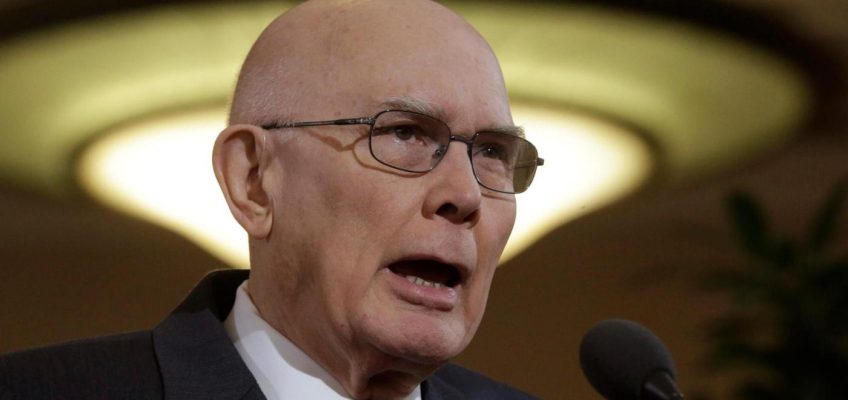By MEAD GRUVER, HOLLY MEYER and HANNAH SCHOENBAUM, Associated Press
SALT LAKE CITY (AP) — Dallin H. Oaks, a former Utah Supreme Court justice known for his jurist sensibilities and traditionalist convictions on marriage and religious freedom, is expected to be the next president of The Church of Jesus Christ of Latter-day Saints and its more than 17 million members worldwide.
The leadership transition follows the recent death of President Russell M. Nelson and comes as many of the church’s U.S. members are reeling from a deadly attack on a Michigan congregation and a high-profile assassination in Utah where the denomination known widely as the Mormon church is headquartered.
Oaks is the longest-tenured member of a top body of leaders called the Quorum of the Twelve Apostles. That makes him next in line to be president under a tradition established more than a century ago to ensure a smooth handover and prevent any lobbying internally or publicly. The formal announcement likely will come at some point after Nelson’s funeral on Oct. 7. He was 101 when he died Saturday.
At 93, Oaks will be among the oldest presidents. Seven of the past nine have served into their nineties, including five beyond Oaks’ current age.
An open church confronts violence
For a faith that prioritizes being welcoming — especially at local churches on Sundays — last weekend’s attack on a worship service in Michigan was shocking.
Services in Grand Blanc Township had just started when a former Marine rammed his pickup truck into the church and started shooting. Four people died and eight were wounded in Sunday’s attack about 60 miles (96 kilometers) north of Detroit. The attacker lit a fire before being chased and killed in an exchange of gunfire with police.
Related Articles
Florida was a top destination for immigrants who came to the US under Biden
Stephen King is the most banned author in US schools, PEN report says
US stocks drift following the latest discouraging signal on the job market
Federal employee caused shooter hoax to bond with co-workers, prosecutors say
Part of a high-rise apartment building in New York City collapses, no injuries reported
“We all seek answers and understanding in the wake of trauma, shock, and grief. We are grateful to all who are reaching out with service, prayers, and words of support during this difficult time,” Oaks said in a statement that also paid tribute to Nelson.
Nelson’s “timeless teachings” help people find comfort amid suffering, Oaks said.
Utah is also still reeling from the Sept. 10 shooting death of conservative activist Charlie Kirk at Utah Valley University. His alleged shooter, Tyler Robinson, grew up as a church member.
Violence could be a talking point this weekend at the church’s twice-annual general conference in Salt Lake City, said Matthew Bowman, a Claremont Graduate University professor specializing in U.S. religious history. Church leaders often address major issues of the moment while leaving some room for the nearly 100,000 in-person attendees and many more watching remotely to interpret religious doctrine for themselves.
Church policy allows only law enforcement officers to bring guns and other lethal weapons on church property. It’s unclear whether new measures are coming.
Experts skeptical an Oaks presidency will bring major change
A longtime prominent voice in the church, Oaks joined the Quorum of the Twelve in 1984 around the same time as Nelson.
When Nelson became president, he elevated Oaks to the First Presidency, the top governing body.
“I suspect that Oaks has had a fairly strong hand in leadership through Nelson’s presidency,” Bowman said. “I think we’re not going to see a very tremendous pivot.”
Early on as an apostle, Oaks was involved in a crackdown on far-right extremism that resulted in some excommunications. In 2020, he gave a speech about having faith in elections without resorting to radicalism or violence.
Whereas Nelson focused on the faith’s global footprint, including picking apostles with international and immigrant backgrounds, Oaks may refocus on the U.S. and its politics, Bowman said.
With Nelson’s death, there is a vacancy in the Quorum of the Twelve that Oaks would fill as president — one way church presidents can leave their imprint. Some wonder if he will tap the church’s commissioner of education, Clark Gilbert, who has led efforts at the church-owned Brigham Young University campuses to enforce church orthodoxy, Bowman said.
An Oaks presidency creates anxiety for LGBTQ+ members and allies
Oaks has been a driving force against same-sex marriage and in upholding a teaching that homosexuality is a sin, creating anxiety and concern among the faithful who are gay, lesbian and transgender.
He often delivered speeches reinforcing the faith’s stance, including one in which he said the intended meaning of “gender” in church doctrine is “biological sex at birth.” Church policies introduced in 2024 significantly restricted involvement of members who have transitioned physically or socially, such as changing their name or pronouns.
Some remember surveillance of and a crackdown on gay students Brigham Young University while Oaks was school president in the 1970s. A church spokesman acknowledged in 1979 that BYU security had staked out gay bars but said Oaks put a stop to the practice when he found out about it.
Yet in recent years Oaks has been part of a few key church moves that suggest he might not make the topic a centerpiece of his administration, experts say.
Oaks was Nelson’s closest adviser in 2019 when Nelson rescinded a policy that banned baptisms for children of gay parents and labeled same-sex couples as sinners eligible for expulsion. The move reversed a decision that was devastating and confusing to gay and lesbian church members who had been buoyed in previous years by church leaders’ calls for more love and understanding for LGBTQ+ members.
“It would be really unlikely that he would, you know, go back on that when he was one of the decision-makers in removing that restriction,” said Paul Reeve, Simmons Chair of Mormon Studies at the University of Utah.
Oaks also helped the church strike a compromise in 2022 in which the faith backed proposed federal legislation to safeguard same-sex marriages so long as those laws didn’t infringe upon religious liberty or force the faith to perform same-sex marriages or grant them official church sanction.
Noah Hanson, who is gay and grew up in the religion, worries Oaks’ ascension will drive a greater wedge between LGBTQ+ people and their devout family members. Under Nelson, the church largely backed off talking about homosexuality, Hanson said, giving his parents the space to “make a little progress.”
“They’ve started telling my husband that they love him,” said the 27-year-old from Logan, Utah.
If Oaks is as outspoken about LGBTQ+ people as he has been in the past, Hanson worries that progress will slip. His parents revere church presidents, who are considered prophets by members, even if their policies are harmful to their own children, he said.
“If Dallin H. Oaks doesn’t soften his stances on how marriage is only between a man and a woman, or that the act of homosexuality is a sin, like if he lays down that hammer, I feel like that’s gonna ruin my relationship with my parents,” Hanson said.
Oaks’ presidency could be stylistically different
Well known for dry sermons and speeches that appeal more to reason than emotion, Oaks brings a jurist’s sensibility to his work. Compared to Nelson’s sentimentalism, Oaks is cooler, more precise and lawyerly, Bowman said.
Becoming president, though, could inspire him to adopt a more personal approach, suggested Patrick Mason, a religious studies and history professor at Utah State University.
“It’s a very different thing to be president of the church and to recognize that now you are meant to be all things to all people within the church,” Mason said.
Oaks has been outspoken about maintaining civil public discourse, urging people shortly before the 2024 presidential election to “avoid what is harsh and hateful” and be peacemakers in their communities.
Following anti-vaccine backlash from church members after celebrating the COVID-19 vaccines on social media, Nelson and Oaks began talking more about the need for moderation, political dialogue and avoiding conspiracy theories and hate.
“That really, I think, alarmed Nelson, and it alarmed Oaks,” Bowman said. “I think this is back on Oaks’ radar, that political extremism in the church is a problem. And he may be, I think because of his training and because of his background, perhaps more willing than Nelson was to take concrete steps.”
Gruver reported from Fort Collins, Colorado, and Meyer from Nashville. AP corporate archivist Sarit Hand in New York City contributed to this report.
Associated Press religion coverage receives support through the AP’s collaboration with The Conversation US, with funding from Lilly Endowment Inc. The AP is solely responsible for this content.




